Texas has become the first state in the nation to enact a “Heartbeat” abortion law, which bans abortions once a fetal heartbeat is detected.
As of 12:00 a.m., September 1, “the Texas Heartbeat Act is in effect,” said a statement from Texas Right to Life, noting the U.S. Supreme Court “has not ruled on abortionists’ request to block the policy.”
“Texas is now the first state ever to enforce a heartbeat law,” the pro-life organization celebrated.
In a last-minute effort to block the law, abortion providers applied to the U.S. Supreme Court for an injunction, but the Court has not yet ruled on the matter – though could do so at any time – and the law, as passed by the Texas legislature and signed into law by Gov. Greg Abbott (R), is now in effect.
Texas Right to Life Legislative Director John Seago responded following the abortion providers’ application to the High Court:
The abortion industry is using their last, desperate option in an attempt to block the life-saving Texas Heartbeat Act from taking effect Wednesday. This anti-Life lawsuit is invalid. We are hopeful that Justice Alito will examine the compelling arguments raised explaining why the case should be ultimately dismissed.
However, for major matters like this, standard procedure is for the justice supervising the relevant appeals court – in this case, the U.S. Court of Appeals for the Fifth Circuit – to refer the application to his eight colleagues for the full Supreme Court to vote on the matter.
The abortion providers’ appeal comes after their hopes to block the law were thwarted over the weekend when the Fifth Circuit canceled a hearing initially planned for Monday. The district judge was blocked from granting a preliminary injunction before September 1.
Other states have passed “heartbeat” bills, but, once signed into law, abortion rights activists filed lawsuits challenging them. Subsequently, courts have blocked these laws, ruling they are unconstitutional in light of the Supreme Court’s 1973 ruling in Roe v. Wade and subsequent decisions.
The Texas measure, however, contains a unique enforcement mechanism whereby any private citizen may file a civil lawsuit against an abortion provider or any other individual who “aids or abets” a “criminal abortion.”
The law’s civil enforcement mechanism limits actions taken to violations of the “heartbeat” ban, i.e., abortions sought after a fetal heartbeat is detected.
Texas Right to Life has organized an effort to help private citizens enforce the new law.
Its new website, titled ProLifeWhistleblower, invites citizens to “send an anonymous tip” or “join the team.”
The pro-life organization explains at its site that “[a]ny abortion performed in violation of the Texas Heartbeat Act is a criminal offense, and any individual or entity that aids or abets an abortion on a child with a detectable heartbeat in Texas is violating the law as well.”
According to the website, “Aiding or abetting” an abortion might occur when:
- Abortion funds that provide financial or logistical support to women who kill their unborn children after a fetal heartbeat is detectable
- Doctors or medical personnel who provide abortion referrals after six weeks of gestation
- Any other individual or entity that aids or abets an illegal abortion in any way
“Any person can sue any abortion provider who kills an unborn child after six weeks of gestation—and any person can sue anyone who aids or abets these illegal abortions,” Texas Right to Life states. “All of these individuals must pay damages to the person who sued them of at least $10,000 for each illegal abortion that they perform or assist.”
“Texas Right to Life will ensure that these lawbreakers are held accountable for their actions,” the group says.
Texas resident Abby Johnson, founder of And Then There Were None, which helps get abortion workers out of the industry, said she is “proud to live in this great state and under a governor and legislature that puts the lives of innocent human beings above any other policies.”
“More than 85% of abortions will be abolished in Texas,” she observed.
It should be noted that, contrary to what pro-abortion groups are saying, the viability or legitimacy of Roe v. Wade is not currently before the Supreme Court in this stay application. This dispute before the Court concerns whether and when federal courts have jurisdiction to rule on who can sue whom and when federal courts can issue rulings on those matters.
The case is Whole Women’s Health v. Jackson, No. 21A24 in the Supreme Court of the United States.

COMMENTS
Please let us know if you're having issues with commenting.